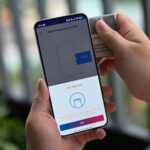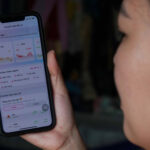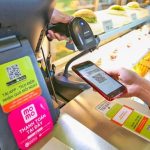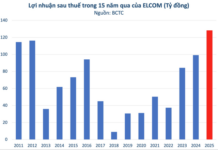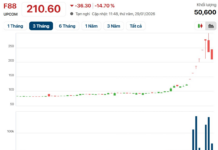Accordingly, from today (August 25), more than 14 million users of this e-wallet can use the international QR payment feature in 5 Asian countries. This strategic move showcases the technological capabilities of a “made-in-Vietnam” product, contributing to the realization of the aspiration of Vietnamese technology accompanying Vietnamese people to the world.
By the end of 2025, Zalopay plans to introduce a new feature that allows international guests to make QR payments in Vietnam using Visa and Mastercard cards issued in any country, thus expanding its global payment connectivity.
Earlier, from March 2025, Zalopay became Vietnam’s pioneering payment application, allowing users to scan QR codes for payments at over 120,000 stores within the NETS and SGQR networks in Singapore.

Vietnamese tourists can use the Zalopay wallet to scan QR codes for payments when traveling in 5 Asian countries
“Regarding the domestic market, in the very near future, users will be able to use the Zalopay application to scan QR codes for WiFi, bank card information, or even license plate numbers to check and immediately pay for traffic fines. Thus, opening Zalopay to scan QR codes will not be limited to just making payments but will become a habit associated with daily activities,” said Mr. Tran Ba Khoi Nguyen.
Regarding security, Zalopay’s representative said that they have implemented multiple layers of “invisible protection,” such as warnings when transferring money to risky accounts or requesting reconfirmation upon detecting abnormal operations.

Event attendees can immediately purchase their favorite fashion designs with a simple QR scan on Zalopay
Regarding cross-border QR payments, the National Payment Corporation of Vietnam (NAPAS) shared that following the Government’s orientation and under the direction of the State Bank, as the provider of the national retail payment infrastructure, the company has implemented plans to expand cross-border payment connectivity with multiple Asian countries.
To date, NAPAS has completed connections with Thailand, Cambodia, and Laos and is actively coordinating to deploy connections with other countries, including China, South Korea, and Japan. The cross-border QR payment service between Vietnam and China is expected to be completed this year.
According to experts, cross-border payment connectivity is a trend in many countries in the region and worldwide, aiming to promote the use of local currencies in payment activities and economic development in general.
“Biometric Authentication: The New Norm for ATM and e-Wallet Security”
As of October 1st, individuals registering for an e-wallet or electronic card must undergo biometric authentication, as mandated by the State Bank. This added security measure ensures the safety and integrity of your personal information, protecting you from potential fraud and identity theft. With this simple and secure process, you can rest assured that your financial transactions are in safe hands.
The Rise of Stock Market Investing Through E-Wallets: A New Era of Financial Opportunity
Many retail investors are now turning to stock trading via e-wallets with very small capital, and they’re even utilizing AI to help them “ride the waves” of the market.
Combating ‘Loan Sharks’ with ‘White Knights’
“With the noble goal of ‘leaving no one behind’, we must strive to empower the underprivileged by providing them access to ‘white credit’. It is our duty to ensure that those who are less fortunate have the same opportunities as everyone else. By offering them a chance to obtain this ‘white credit’, we are giving them a tool to build a better future for themselves and their loved ones.”

